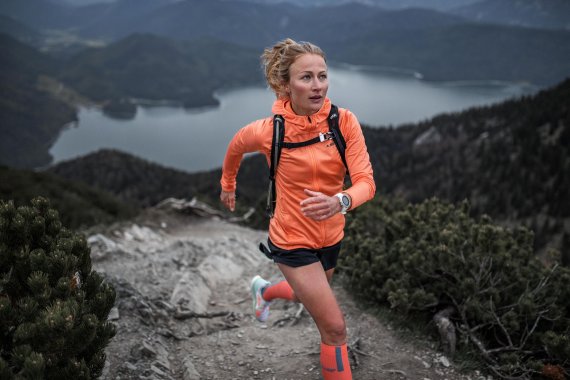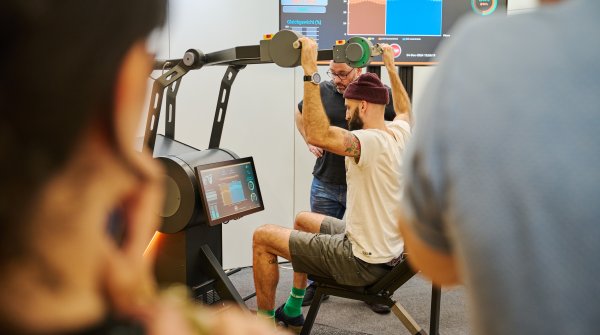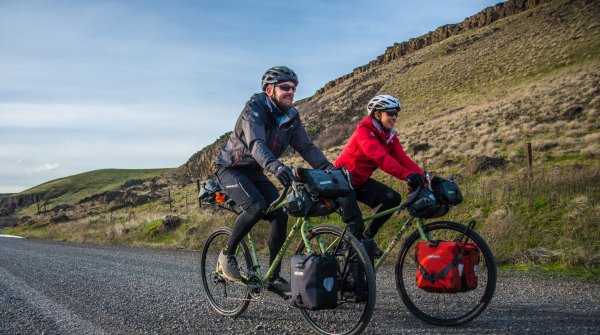
ISPO.com: We know the attitudes from sports broadcasts: The broad chest signals dominance, the sloping shoulders a defeat. Why do we do it this way? Especially in sports?
Caja Schöpf: This has evolutionary reasons. Whoever adopts a dominant posture signals strength, courage and aggressiveness to the enemy, whereas sloping shoulders and the drooping head are doomed to failure. They signal humility, fear and doubt. Therefore it makes sense to be aware of this, especially in sports. Because we are mostly in competition and do not want to signal humility and fear to the "enemy". And regardless of the external effect, the internal effect also plays a major role. Our body language has a great influence on our thoughts and feelings and thus ultimately on whether we can perform or not - because nobody can call on performance when faced with fear and doubt.
What differences or similarities between men and women are there in terms of body language in sport?
Actually none, except that men often tend to have a more dominant body language. Women often need to become aware of the effect their posture can have externally and internally. But men sometimes have the same problem: not every man is born with a dominant body language and, like women, must learn to use it in a more targeted manner.
From your coaching experiences with various athletes: Does body language change in the course of life?
Yes and no, I think certain aspects belong to the personality. Depending on the type of sport or on your professional and personal career, you learn, improve or change. What is certainly different is that children often act more freely, because at least at a young age they do not think so much about what someone else might think about them. Then comes socialization and they adapt more and more.

Do individual athletes have a different body language than team athletes?
Many people think so, because it is often forgotten that it is not only about the external effect, but also about the internal effect. That's why dominant body language always remains the same, no matter whether individual or team sport. What I know from experience is that team athletes are more likely to deal with this in their career and therefore often show it more clearly. Just think how many individual athletes we know from tennis, skiing, athletics, who use body language on a massive scale.
Is there a particularly striking example from the world of sport of the interplay between body language and emotional state?
I would say that when Christiano Ronaldo is on the penalty shootout, no goalkeeper has ever been happy. Ronaldo polarizes a lot, but he's a perfect example of what body language can do inside and outside.
What can you do so that your own body language has a positive influence on the mindset? For example, how can you become more self-confident? Not only as a professional, but also as a hobby athlete or in a professional context?
Practice. Get clear feedback, observe yourself in the mirror, give yourself tasks, such as looking at your head, shoulders and legs in difficult situations and then observe your own thoughts and feelings. What happens inside me? Do I notice a difference from before? If you feel a positive effect, and this happens in 99 percent of all cases, you will repeat it and thus slowly change your behaviour a little bit. This works in all areas of life, you don't have to be a professional athlete for it. Body language is an important tool that we should use much more.
Are there exercises for this?
To do this, you sit down in a room for three minutes in the so-called low power pose, which means: sitting on the floor, making small, shoulders and head down, cross your legs, crouch. Then you change position and stand up for three minutes: Legs hip-width apart, shoulders and head up, chest out, arms to your side. How do you feel afterwards? Observing yourself is also a good exercise: in the mirror, in the streets, in the windows, or you can get feedback, from a professional or from friends.
Sport helps you a lot to get tension in your body, that is important for your posture. Because how am I supposed to know what tension is if I have never experienced it before?
- Awards
- Mountain sports
- Bike
- Fitness
- Health
- ISPO Munich
- Running
- Brands
- Sustainability
- Olympia
- OutDoor
- Promotion
- Sports Business
- Textrends
- Triathlon
- Water sports
- Winter sports
- eSports
- SportsTech
- OutDoor by ISPO
- Heroes
- Transformation
- Sport Fashion
- Urban Culture
- Challenges of a CEO
- Trade fairs
- Sports
- Find the Balance
- Product reviews
- Newsletter Exclusive Area
- Magazine






